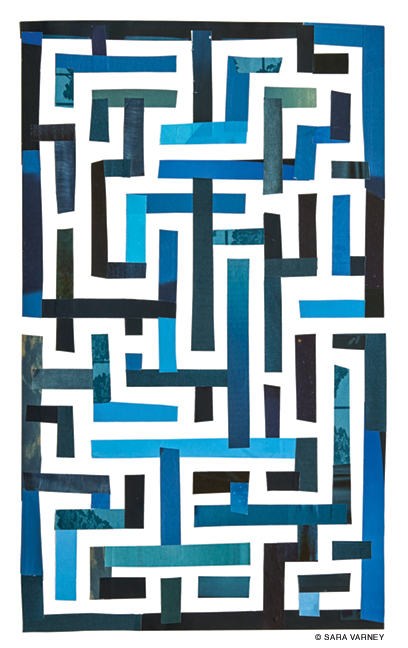
The Wolf Humanities Center rethinks decision-making.
In a year of constricted options, the Wolf Humanities Center’s 2020–21 Forum topic, “Choice,” seems both apt and ironic. In deference to COVID-19, the forum—which launched in October and runs through March—is being presented entirely virtually for the first time. As in the past, most events are available to stream after their live premieres.
The topic of “Choice” was itself chosen about two years ago from a proposal by Sophia Rosenfeld, Walter H. Annenberg Professor of History, who was named topic director. Rosenfeld, an intellectual and cultural historian, is writing a book on the relationship between choice and modern conceptions of freedom.
“So much of our life is organized around the idea, especially in the contemporary United States, that choice is at the root of freedom, that the more opportunities for choice and the more options we have, the freer we will find ourselves as a result,” Rosenfeld says. The forum, she notes, will “look at the ways in which choice structures social, political, and cultural life—and also when choice isn’t important, when people don’t have choices, and when choice is not highly valued.”
The program includes talks and performances, all free, as well as a pay-what-you-wish complementary film series, presented by the Penn Museum, on the idea of cultural syncretism.
Inevitably, discussion of COVID-19 has found its way into the forum discussions—most prominently in a November 18 talk, “Choice in the Time of a Pandemic,” by Renata Salecl, professor of psychology and psychoanalysis of law at the University of London.
The pandemic necessitates a variety of choices and “produces divisions between those whose lives need to be saved and those who can be discarded,” Salecl said. Social and economic restrictions are shaping “not only people’s attitudes toward the pathogen” but toward themselves and others. Closing national borders, for instance, entails “the fantasy that one can leave bad people out and keep good people within the borders from becoming infected,” she said.
Also misleading is the notion that we are all “in the same boat”—given that “some people might be on yachts,” others on barely seaworthy vessels. “Isolation has become a new expression of inequality,” Salecl said, with the wealthy retreating to country houses, while others, by choice or necessity, risk infection on the frontlines of the crisis.
In the case of medical care, Salecl outlined four approaches to the problem of allocating scarce resources such as ventilators: selection by lottery, the principle of “first come, first served,” helping the most critically ill patients first, and a utilitarian approach that attempts to rank the relative value of individual lives according to age and other factors.
When it comes to social choices, such as mask wearing, she said, some people are manifesting aggression, embracing denial, or, increasingly, “abandoning rational choice” altogether—a development about which “epidemiology says little.”
The forum began with an October 14 talk by Sheena Iyengar W’92 C’92, “Rethinking the Value of Individual Choice,” that also touched on the novel coronavirus. Iyengar, a business professor at Columbia University and author of The Art of Choosing (2010), emphasized the role that culture plays in choice. While Americans value individual rights, she said, Asians tend to look toward collective welfare in making choices—a perspective that has influenced the propensity to wear masks during a pandemic.
Iyengar is probably best known for a 2000 study that showed that, when confronted by too many choices, people succumbed to “choice paralysis.” In general, she said, “You have to be choosy about choosing. Don’t make every choice. You have to decide which choices are worth your time. I will only make the choices that I think are really, really important.”
Also ripped from the headlines was Alex Guerrero’s November 11 talk, “Lottocracy: A New Kind of Democracy,” previewing his forthcoming book by the same name. Speaking in the aftermath of the election, Guerrero, a philosophy professor at Rutgers University (who taught at Penn from 2012 to 2016), argued that our system of elected representatives should be junked in favor of a lottery system.
He outlined several “pathologies that should trouble us” within the status quo, including public ignorance, financial barriers to participation, hurdles to registration and voting, gerrymandering, the capture of representatives by industry interests, the emphasis on emotionally resonant issues and short time horizons, the exacerbation of in-group/out-group thinking, and overrepresentation of a socioeconomic elite with insufficient concern for the disempowered.
His solution, relying on precedents that extend from ancient Athenian democracy to citizens’ assemblies in Canada and elsewhere, would be to concentrate decision-making in several single-issue legislative bodies, with representatives chosen by lottery and generously compensated for their labors.
“There’s a question about legitimacy,” he said, “and maybe worries about how this would actually work in practice,” particularly about how competent such representatives would be. The single-issue focus and a reliance on expert consultants would build competencies, Guerrero said.
“Random selection is going to prevent the influence that powerful interests have through elections,” and would make it “hard to buy people off,” he said. In addition, representatives chosen by lottery would be free to think long-term and would constitute “a more demographically representative sample” of the population.
Among the upcoming talks this winter are “Freedom of Choice in Art and Literature” (January 27), spotlighting the sculpture and installation artist Risa Puno and the novelist Margaret Wilkerson Sexton; “The Ethical Algorithm and the Future of Choice” (February 10), with Michael Kearns, National Center Professor of Management & Technology at Penn [“Moral Code,” Nov|Dec 2020]; and “The Past and Future of Reproductive Choice” (February 24), with Linda Greenhouse, senior research scholar at Yale Law School, and two other legal scholars.
For a full listing of events, visit wolfhumanities.upenn.edu/events/choice.
—Julia M. Klein

